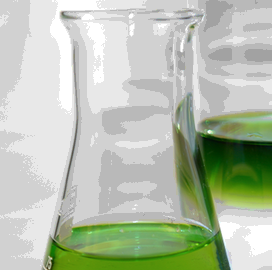Algal fuel moving forward
 Researchers have taken a new step toward commercial-scale, sustainable biofuel from algae.
Researchers have taken a new step toward commercial-scale, sustainable biofuel from algae.
Synthetic Genomics in the USA has developed a genetically engineered strain of alga that produces twice as much lipid as the wild parent, but can grow at a similar rate.
Experts have been working for years on the idea of using fats and oils produced by phototrophic microalgae - microscopic organisms that can produce lipids when grown using light, water and CO2 - to produce biodiesel.
Until now, these efforts have been restricted to strains that are unable to make sufficient amounts for commercialisation.
The industrial microalga Nannocholoropsis gaditana can make up to six times more lipid than lab strains, but despite decades of research, any improvements in lipid productivity of Nannocholoropsis sp. have crippled growth, limiting the commercial promise.
Eric Moellering and colleagues used several engineering tools, including CRISPR–Cas9 gene editing, to identify ‘ZnCys’, which regulates accumulation of lipids in industrial strains of N. gaditana.
The authors modified ZnCys and found that this doubled lipid productivity — to up to five grams per metre per day — while permitting growth at nearly equivalent rates to that of the parental, unmodified strains.
Understanding how to increase lipid production of microalgae while retaining their ability to grow is an advancement toward a microalgal phototrophic production process for lipids that would remove the need for biodiesel to be reliant on sugars produced by land-grown plants.








 Print
Print